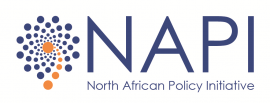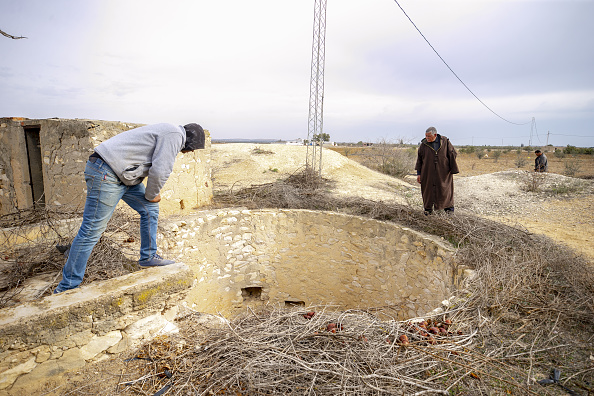The Middle East Institute (MEI) and the North African Policy Initiative (NAPI) are pleased to announce the sixth in a series of roundtable discussions inviting engaged youth to share their perspectives on the key issues facing their country’s future. This policy-oriented discussion will feature young Tunisian researchers offering their views on the current environmental challenges in their country and the opportunities ahead.
Tunisia is already facing the reality of climate change. From the degradation of natural resources and water scarcity to desertification and coastal erosion, the country has to cope with complex and interconnected environmental challenges. While Tunisia has put the environment on top of its political and economic agenda (with Article 45 of its Constitution acknowledging the “right to a healthy and balanced environment and the right to participate in the protection of the climate”), there is still room to do more.
Speakers
Abir Ben Romdhane
Natural Resource Management Senior Export, Sahara and Sahel Observatory
Mohamed Walid Jomni
Junior Climate Negotiator, Young Tunisian Negotiators
Marouen Taleb
Postdoc Researcher, Tunis’ Research Institute on Contemporary Maghreb (IRMC/CNRS)
Fatine Ezbakhe, moderator
Senior Researcher, Institute for Environmental Science (ISE) of the University of Geneva
Five Key Takeaways
-
75% of Tunisia is threatened by desertification, especially in the south, which is mostly agricultural. A dry year is recorded every 3 years. Environmental policies have so far been incremental, but will have to become transformational to succeed.
-
Tunisia has been called a ‘leading light’ in environmental reform, but more local initiatives and youth involvement are necessary to tackle climate challenges. Tunisian institutions are not well prepared to face climate issues, especially in the areas farther from the cities, which need more help with climate interventions. Ecosystem restoration can create more jobs and increase investment opportunities in Tunisia.
-
The Tunisian government struggles to interface with state universities, which provide environmental research. Public-public partnerships are needed, wherein social science is integrated into environmental science. Researchers must consider which policies are needed by the people and realistic for the state to implement. Hopefully this approach will allow for more partnerships between university researchers and government policymakers. The Tunisian state is far more likely to listen to recommendations for environmental programs if they include the social demands of the public.
-
The Tunisian public sector lacks the legal framework to work with private companies to fight climate change. Many opportunities are lost for this reason. Due to Tunisia’s history of dictatorship, environmental governance is researched mostly by foreigners, not by Tunisians. A cross-cutting approach is necessary wherein democracy, rights and governance enable climate change policies from the grassroots. For example, a local sustainable fishing initiative put respect for traditional life at its center and is succeeding.
-
For sustainable entrepreneurship to succeed, a network is needed where business, academia, public and private stakeholders can meet. Education needs to promote skills that encourage entrepreneurship. Obstacles include a lack of studies about societal needs in Tunisia and a lack of inclusion for regions outside Tunis, which are poorer and more agrarian.
Detailed Speaker Bios
Abir Ben Romdhane
Abir Ben Romdhane is a senior expert at the Sahara and Sahel Observatory (OSS), in charge of managing projects on ecosystem restoration and combating desertification and land degradation. She has more than ten years of international experience as an environmental expert and works on a range of issues in Africa, such as environmental monitoring and assessment, climate finance, desertification, and the Sustainable Development Goals (SDGs). She also works in conservation and sustainability, specifically to raise awareness of water and biodiversity among youth in the Mediterranean and to empower women.
Mohamed Walid Jomni
Mohamed Walid Jomni is a social entrepreneur and a climate activist. He has co-founded the Beskla project to promote cycling as an effective and sustainable form of transportation. He is also a member of the Tunisian group of Young Negotiators, with whom he has designed policies on how to integrate youth into the strategic development. He has taken part to the implementation of 2022 round of the UNDP-4YFN Women Innovators Programme (WIP). Mohamed Walid has received several awards for his work including the nominations of Human Rights Ambassador by OHCHR Tunisia, and Young Futurist by UNDP.
Marouen Talib
Marouen Taleb is a researcher at Tunis’ Research Institute on Contemporary Maghreb (IRMC/CNRS). Marouen holds a Master's degree in Economic Geography and a PhD in Urban policy and Development from the National School of Architecture and Urban Planning of Tunis. He is a cofounder of the North African Policy Initiative (NAPI). Currently, his fields of research include economic development models, migration, transborder communities, local governance, and decentralization in North African countries. Marouen also works as an expert consultant for strategic urban planning programs in African and Arab countries.
Fatine Ezbakhe, moderator
Fatine Ezbakhe is a senior researcher at the Institute for Environmental Sciences (ISE) of the University of Geneva. She is also a member of the UNESCO Chair on Hydropolitics and the Geneva Water Hub, where she coordinates the research project “Monitoring for International Hydropolitical Tensions.” She also coordinates and develops several teaching exercises and tailor-made trainings on water governance and politics, including the Summer School on Water Governance: Frameworks and Negotiations, and the Mediterranean Youth for Water (MedYWat) network, a community aiming to bring young water professionals to the forefront of water-related policy-making in the region.
In Partnership With:

Photo by Yassine Gaidi/Anadolu Agency via Getty Images












